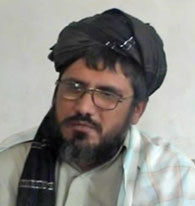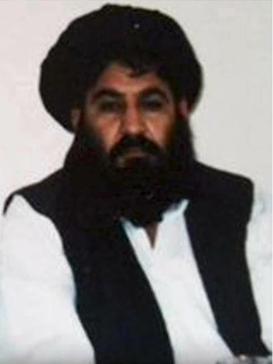
The Taliban, which also refers to itself by its state name, the Islamic Emirate of Afghanistan, is an Afghan political and militant movement with an ideology comprising elements of Pashtun nationalism and the Deobandi movement of Islamic fundamentalism. It ruled approximately 75% of Afghanistan from 1996 to 2001, before it was overthrown by an American invasion after the September 11th attacks carried out by the Taliban's ally al-Qaeda. The Taliban recaptured Kabul in August 2021 following the departure of coalition forces, after 20 years of Taliban insurgency, and now controls the entire country. The Taliban government is not recognized by any country and has been internationally condemned for restricting human rights, including women's rights to work and have an education.

Mullah Muhammad Omar was an Afghan mujahideen commander, revolutionary, and the cleric who founded the Taliban. During the Third Afghan Civil War, the Taliban fought the Northern Alliance and took control of most of the country, establishing the First Islamic Emirate for which Omar began to serve as Supreme Leader in 1996. Shortly after al-Qaeda carried out the September 11 attacks, the Taliban government was toppled by an American invasion of Afghanistan, prompting Omar to go into hiding. He successfully evaded capture by the American-led coalition before dying in 2013 from tuberculosis.
Najibullah is a male Muslim given name, composed of the elements Najib and Allah. It means distinguished (servant) of God. It may refer to:

Dadullah was the Taliban's most senior militant commander in Afghanistan until his death in 2007. He was also known as Maulavi or Mullah Dadullah Akhund. He also earned the nickname of Lang, meaning "lame", because of a leg he lost during fighting.

Mullah Mansoor Dadullah was the Taliban militant commander Mullah Dadullah's younger half-brother who succeeded him as a senior military commander of the Taliban in southern Afghanistan. He came from the Arghandab district of Kandahar province, and belonged to the Kakar Pashtun tribe.

The Taliban, which also refers to itself by its state name, the Islamic Emirate of Afghanistan, is an Afghan militant movement, that governs Afghanistan, with an ideology comprising elements of Pashtun nationalism and the Deobandi movement of Islamic fundamentalism.

Muhammad Rasul was the leader of the High Council of the Islamic Emirate of Afghanistan, a Taliban dissident group in Afghanistan, until the group's dissolution in 2021. He was a Taliban-appointed governor of Nimruz Province, Afghanistan. Rasul exerted pressure and suppression on Pashtun factions unpopular with the Taliban, and made a considerable fortune controlling cross-border drug-smuggling through Nimruz.

The Mullah Dadullah Front was an insurgent group in Afghanistan that claimed responsibility for a series of bombings and assassinations centered in Kabul.

Akhtar Mohammad Mansour was the second supreme leader of the Taliban. Succeeding the founding leader, Mullah Omar, he was the supreme leader from July 2015 to May 2016, when he was killed in a US drone strike in Balochistan, Pakistan.

Najibullah, often referred to as Mullah Najibullah or Hajji Najibullah, and also known by the pseudonym Omar Khitab, is an Afghan militant leader who is the head of the Taliban splinter group Fidai Mahaz in Afghanistan.

Mullah Hibatullah Akhundzada, also spelled Haibatullah Akhunzada, is an Afghan cleric who is the supreme leader of Afghanistan in the internationally unrecognized Taliban regime. He has led the Taliban since 2016, and came to power with its victory over U.S.-backed forces in the 2001–2021 war. A highly reclusive figure, he has almost no digital footprint except for an unverified photograph and several audio recordings of speeches.
Usman Ghazi was the Emir of the Islamic Movement of Uzbekistan, a militant group based in Afghanistan and Pakistan. He succeeded Usman Adil after the latter's death in a drone strike.

The Islamic State–Taliban conflict is an ongoing insurgency by the Islamic State Khorasan Province (IS-KP) against the Taliban regime in Afghanistan. The conflict initially began when both operated as rival insurgent groups in Nangarhar; since the formation of the Taliban's state in 2021, IS-KP members have enacted a campaign of terrorism targeting both civilians and assassinating Taliban members using hit-and-run tactics. The group have also caused incidents and attacks across the border in Pakistan.

The Supreme Leader of Afghanistan, officially the Supreme Leader of the Islamic Emirate of Afghanistan and also styled by his religious title Amir al-Mu'minin, is the absolute ruler, head of state, and national religious leader of Afghanistan, as well as the leader of the Taliban. The supreme leader wields unlimited authority and is the ultimate source of all law.

High Council of the Islamic Emirate of Afghanistan (HCIEA) (Pashto: دٙ اَفغانِستان اِسلامي اِمارَت عالي شوریٰ, romanized: Də Afġānistān Islāmī Imārat Ālī Šūrā ; Dari: شُورٰایِ عٰالئِ اِمٰارَتِ اِسلٰامئِ اَفغٰانِستٰان, romanized: Šūrā-yi Ālī-yi Imārat-i Islāmī-yi Afġānistān) was a breakaway Taliban faction active in Afghanistan since 2015. The faction broke away from the Taliban in 2015 following the appointment of Akhtar Mansour as the leader of the Taliban and elected Muhammad Rasul as its leader. The faction was involved in deadly clashes with mainstream Taliban in southern and western Afghanistan, leaving scores of dead on both sides. The Islamic Republic of Afghanistan allegedly provided financial and military support to the faction, however, both the Islamic Republic and the faction denied this. Following the Taliban offensive of 2021 and the fall of Afghanistan to Taliban forces, the group dissolved, and its leaders pledged allegiance to the new government.
Mullah Mohammad Farid Omar is an Afghan Taliban politician who is currently serving as Governor of Parwan province since 2021.
On 21 May 2016, Akhtar Mansour was killed in a U.S. military drone strike on the N-40 National Highway in Pakistan near Ahmad Wal, not far from the Pakistan–Afghanistan border; Mansour had crossed earlier that day from Iran into Pakistan through the Taftan, Balochistan, border crossing, some 450 kilometres (280 mi) away from the spot where he was killed.
Mullah Abdul Manan Niazi was an Afghan politician and military commander. In the 1990s, he was the governor of the Herat and Balkh provinces. He was one of the famous commanders of the splinter group of the Taliban led by Mullah Rasool, and one of the helpers of the Taliban group led by Mullah Hibatullah Akhundzada. He was also a critic of the policy of regional countries, especially Iran and Pakistan, towards Afghanistan.
Mullah Borjan, also known as Mullah Aminullah, was an Afghan Taliban military commander. He was considered to have been an influential military leader in Kandahar Province.












